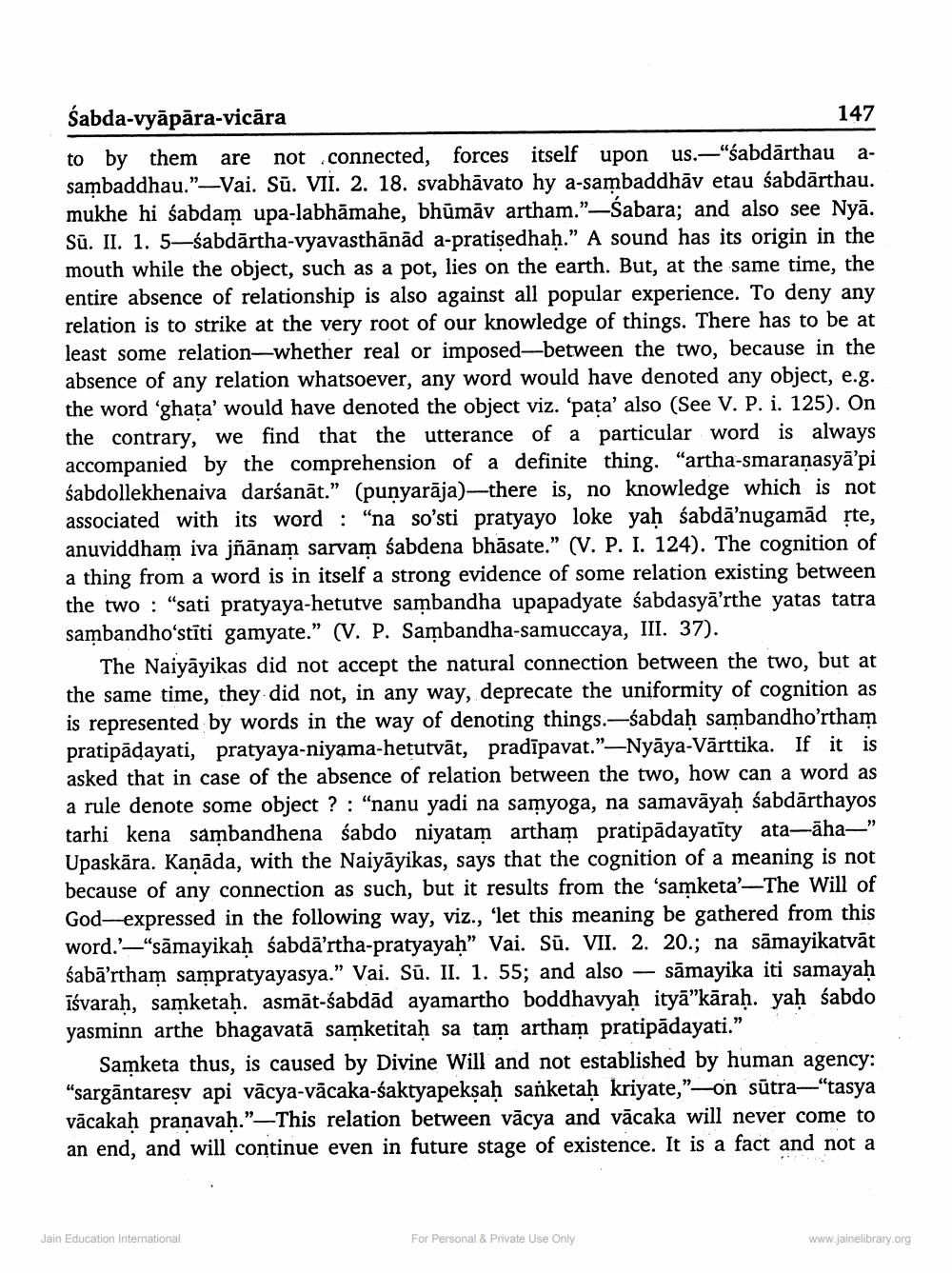________________
Sabda-vyāpāra-vicāra
to by them are not connected, forces itself upon us.-"śabdārthau sambaddhau."-Vai. Sū. VII. 2. 18. svabhāvato hy a-sambaddhāv etau śabdarthau. mukhe hi śabdam upa-labhāmahe, bhūmāv artham."-Sabara; and also see Nyā. Sū. II. 1. 5-śabdārtha-vyavasthānād a-pratiṣedhaḥ." A sound has its origin in the mouth while the object, such as a pot, lies on the earth. But, at the same time, the entire absence of relationship is also against all popular experience. To deny any relation is to strike at the very root of our knowledge of things. There has to be at least some relation-whether real or imposed-between the two, because in the absence of any relation whatsoever, any word would have denoted any object, e.g. the word 'ghata' would have denoted the object viz. 'pata' also (See V. P. i. 125). On the contrary, we find that the utterance of a particular word is always accompanied by the comprehension of a definite thing. "artha-smaraṇasya'pi śabdollekhenaiva darśanāt." (punyarāja)-there is, no knowledge which is not associated with its word "na so'sti pratyayo loke yaḥ śabdā'nugamad ṛte, anuviddham iva jñānam sarvam śabdena bhāsate." (V. P. I. 124). The cognition of a thing from a word is in itself a strong evidence of some relation existing between the two "sati pratyaya-hetutve sambandha upapadyate śabdasya'rthe yatas tatra sambandho'stīti gamyate." (V. P. Sambandha-samuccaya, III. 37).
147
The Naiyayikas did not accept the natural connection between the two, but at the same time, they did not, in any way, deprecate the uniformity of cognition as is represented by words in the way of denoting things.-śabdaḥ sambandho'rtham pratipadayati, pratyaya-niyama-hetutvāt, pradīpavat."-Nyāya-Värttika. If it is asked that in case of the absence of relation between the two, how can a word as a rule denote some object?: "nanu yadi na samyoga, na samavāyaḥ śabdarthayos tarhi kena sambandhena śabdo niyatam artham pratipadayatīty ata-āha-" Upaskāra. Kaṇāda, with the Naiyāyikas, says that the cognition of a meaning is not because of any connection as such, but it results from the 'samketa'-The Will of God-expressed in the following way, viz., 'let this meaning be gathered from this word.'-"samayikaḥ śabda'rtha-pratyayaḥ" Vai. Su. VII. 2. 20.; na samayikatvāt saba'rtham sampratyayasya." Vai. Su. II. 1. 55; and also - sāmayika iti samayaḥ iśvaraḥ, samketaḥ. asmāt-śabdad ayamartho boddhavyaḥ ityā"kāraḥ. yaḥ śabdo yasminn arthe bhagavatā samketitaḥ sa tam artham pratipadayati."
Jain Education International
a
Samketa thus, is caused by Divine Will and not established by human agency: "sargāntareṣv api vācya-vācaka-śaktyapekṣaḥ sanketaḥ kriyate,"-on sutra-"tasya vācakaḥ pranavah."-This relation between vācya and vācaka will never come to an end, and will continue even in future stage of existence. It is a fact and not a
For Personal & Private Use Only
www.jainelibrary.org




